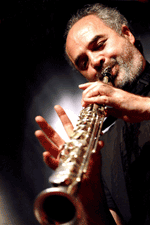> [Archived] Interviews

'Live in Graz & Brașov' - a New Album which Gathers Recordings Made by Jancy Körössy, Lee Konitz and Nicolas Simion
You can find more information in the following interview with Nicolas Simion:
We
are talking about recordings which were made more than ten years ago
in our country and abroad. They were made along with Jancy Korossy,
the saxophonist Nicolas Simion and another great saxophonist, as
well. What do you offer on these albums?
There are recordings made in 2001 in the wake of a tour in Germany, Austria, Hungary and Romania. They are live recordings with a mixed repertoire which includes compositions signed by Jancy Korossy and Lee Konitz, some original works created by me and some jazz standards. I should say it is a classical jazz. There is a mixed repertoire played by a rhythmically department of American musicians: the drummer Peter Perfido and the contrabass player James Singleton.
We
know that each jazz gathering has a particular flavour that is
getting even more special when unfortunately stage friends are gone.
What flavour do these recordings have? How do you recall them?
We are talking about the last period of the great piano player and jazz singer Jancsy Korossy that he spent in Romania, beginning with 2002. Of course, he had a very good period in the ’60s, before he left Romania. He moved back in 1968. He was a famous piano player and he had quite a few concertos. He was invited into the Broadcasting studios and his concertos were either live or studio broadcast. He composed many works but during these thirty years he spent in America he didn’t evolve as the musician as he had wanted and as it would have been nice to happen; so there wasn’t really a success. But as he returned to Romania it was as if he grew young again, as if his energy and creativity turned into a musical spring.
And can this become perceptible?
Yes, it is something that in music can be felt. In Romania he felt he was at home; he was performing with American and Romanian musicians, he was singing his own music. And there was the audience, a part of the audience he had once, and he also had a nice feeling of returning home.
How was it to work with Korossy?
As a musician he was a very drastic guy, as I may put it so, as he didn’t allow any compromise. I shouldn’t say he was rigid, but very accurate in everything he did: in the repertoire he chose, in the recordings he did in studio. But on the other hand, he was a very spontaneous and very unpredictable guy. For example, often during concertos while we were playing standards he would start the plays in some other tonalities; I had to keep in the line with his tonality. On many occasions during a performance he would just inflect a half tone and a tone higher or lower and I had to adapt myself to this. He used to make musical jokes, to say so, but I realized during these collaborations that he loved the music deeply, and that was what kept him alive till he was 86 years old. He used to listen to music a lot and he clued up on what was happening in America, Europe and in Romania.
Basically jazz…
Exactly. He would listen to a lot of music on Mezzo, one of his favourite classical music and jazz channels. He knew almost everything that happened in the history of jazz music and in the African-American tradition. He had an amazing cadence, and was a much visioned music lover and harmonist. There were performances you didn’t know whether it was him or one of the greatest piano players in the world, such as, Rachmaninoff, Chopin or Skriabin, Bill Evans, Debussy, Jancsy Korossy Stravinski or Bartok who was playing.
There is no doubt that his name isn’t a very familiar one and that’s why we don’t apreciate him as he would deserve; let’s not by-pass these albums which are going to be successively released. The first one is named Live in Graz & Brașov. It’s sure-enough that those who met him in the ’60s know exactly what we are talking about, but these document-recorders should make the young musicians to sit up and take notice on what happened in the past and to descover artists like Jancsy Korossy, Richard Oschanitzky Johnny Răducanu, Dan Mândrilă and many others who practically layed the foundations of the Romanian jazz between the ’50s and the ‘60s.
Translated by Anca-Elena Băluț and Elena Daniela Radu
MTTLC, The University of Bucharest














